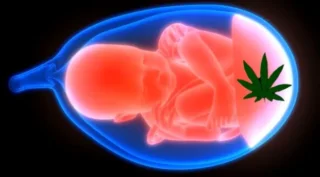
Montgomery Fertility Center
3202 Tower Oaks Boulevard
Suite #370
Rockville, MD 20852

More Infertility Articles
Medicinal Marijuana Hurts Fertility

Marijuana Effects On Fetus
Medical marijuana is now so prevalent and is now akin to a miracle panacea for a host of medical problems. There is increasing usage marijuana among women and men of reproductive age. Along with that is an increasing wave of aftereffects that is surging through the fertility world.
There are little known facets of marijuana that will soon make the uptick in infertility seem like a small factor.
Marijuana has several effects on the reproductive system before conceiving as well as after conceiving.
Effects On Gametes
Let’s take a systematic look at some of these.
Marijuana has been studied and found to affect human sperm. Some studies suggest that marijuana use may have adverse effects on male fertility by reducing sperm production and altering sperm morphology (size and shape). Marijuana can bind to cannabinoid receptors in the testes, which may interfere with normal sperm development.
Marijuana use has been associated with changes in hormone levels, including a decrease in testosterone. Testosterone plays a crucial role in male fertility by supporting sperm production. Alterations in hormone levels can potentially affect fertility. One study found decreased testicular size in marijuana users. Marijuana use also decreases sperm motility in a dose dependent fashion. A prior systematic review and meta-analysis of five case–control studies found that erectile dysfunction was twice as high in marijuana users compared with controls.
Marijuana also affects female reproduction. The endocannabinoid system, which interacts with the compounds found in marijuana, plays a crucial role in regulating the female reproductive system. Animal studies suggest that activation of cannabinoid receptors in the ovaries can disrupt the release of hormones necessary for ovulation, potentially leading to irregular menstrual cycles.
Marijuana use may affect hormone levels involved in the menstrual cycle, such as luteinizing hormone (LH) and follicle-stimulating hormone (FSH). Some studies have reported altered levels of these hormones in women who use marijuana regularly, which could potentially disrupt the timing and regularity of ovulation.
Effects On Fallopian Tubes
In addition to its negative effects on the gametes (Eggs and Sperm); it can interfere with the transport function of the fallopian tube. The fallopian tubes are responsible for picking up recently ovulated eggs and are the location of fertilization of the egg. The fertilized egg is then transported by both the cilia (hair like projections) on the top of cells lining the inside of the tube as well as peristaltic motion of the smooth muscle wall of the tube itself. The interference of the function of the tube can lead to an increase in the risk of ectopic pregnancies.
Effects On Implantation
Now assuming the egg and sperm safely navigate the above pitfalls, and the resulting embryo manages to traverse the fallopian tube to make it to the uterine cavity, there is another snare waiting for it. THC has been shown to impair the proper implantation of the embryo in the uterine cavity. The endometrium, the lining of the uterus, needs to be receptive to support the implantation and growth of a fertilized embryo. Animal studies have suggested that marijuana exposure can affect endometrial receptivity, potentially compromising the successful implantation of an embryo.
The receptors for cannabinoids are evenly distributed throughout the body including the brain. Exposing a growing fetus to marijuana use during pregnancy can raise potential harm at a time when there is rapid growth and development of cells.
Marijuana use during pregnancy can be harmful to the baby’s health and may result in preterm delivery of the baby, stillbirth aka fetal death-in-utero, early death in infancy, as well as developmental issues.
Other Articles You May Find of Interest...
- The Mighty Egg
- Empowering Your Fertility Journey: A Personalized Pretest Initiative Accessible Through Your Primary Doctor
- Grateful for the air we breathe
- Chinese Acupuncture For Infertility
- Medicinal Marijuana Hurts Fertility
- Navigating Infertility Challenges: How a Fertility Specialist in Frisco Can Help
- The Marvelous Fallopian Tubes

















